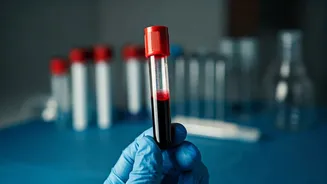Understanding Postpartum Depression
Postpartum depression (PPD) is a significant mental health challenge affecting many women after childbirth. The experience goes beyond the 'baby blues'
and can deeply impact a mother's well-being and ability to care for her child. Symptoms of PPD often include persistent sadness, anxiety, changes in sleep or appetite, and difficulty bonding with the baby. PPD can arise from a combination of hormonal shifts, psychological factors, and the stress of adapting to motherhood. The prevalence of PPD underscores the importance of recognizing the condition and seeking help. Effective treatments, such as therapy and medication, are available. Early identification is crucial for improving outcomes and providing support for both the mother and the newborn, highlighting the urgent need for reliable diagnostic tools and comprehensive care for maternal mental health. This new blood test is a huge step in the right direction.
The New Blood Test
Scientists have created a new blood test capable of predicting a woman's risk of developing postpartum depression with more than 80% accuracy. This innovative test works by analyzing specific biomarkers in the blood that are associated with the onset of PPD. The process involves taking a blood sample from the mother and then analyzing it to gauge the levels of certain substances. This method allows healthcare providers to assess a mother's risk profile early on, which is a major benefit. The use of a blood test offers a more objective and precise assessment compared to relying solely on self-reported symptoms. It allows for personalized care based on an individual’s risk level. The test’s high level of accuracy gives a clear and quantifiable tool for medical professionals to use to assess risk and begin treatment early in the process. This proactive approach improves the likelihood of a positive outcome for the mother and her child.
Early Intervention Benefits
One of the most significant benefits of this new blood test is the potential for early intervention. Knowing a woman’s risk for postpartum depression allows healthcare providers to implement preventative measures and provide support as soon as possible. Early intervention can encompass a variety of strategies, including counseling, therapy, and, when necessary, medication. It can also involve support groups and educational resources for the new mother and her family. The ability to begin interventions early helps alleviate the effects of PPD and enhances the likelihood of a full recovery. Early support can also increase the mother-child bonding experience, fostering a more positive environment for the baby. By identifying at-risk women, healthcare providers can proactively offer the resources and assistance needed to combat PPD's effects. The key to successful recovery from PPD is immediate and comprehensive support.
Implications and Future
This blood test has far-reaching implications for maternal mental health. It provides a more reliable method to identify women at risk and ensures that these women receive the required support. The test also helps raise awareness about postpartum depression, reducing the stigma attached to mental health issues. Further research may focus on understanding the specific biomarkers used in the test. The goal is to develop more effective and targeted treatments. As the test becomes more widely available, it could be incorporated into routine prenatal and postpartum care, enabling healthcare providers to identify and support a wider array of women. The introduction of this diagnostic tool signifies a major stride in improving women's well-being and strengthening families during a crucial time.
























